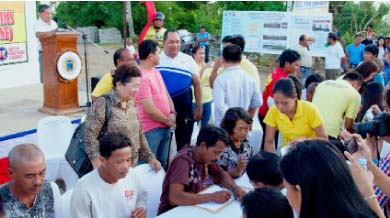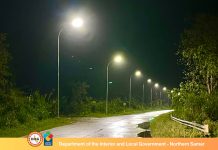
SAN ANTONIO, Northern Samar – Agrarian reform adjudicators from the region have convened here recently for the cascading of Administrative Order No. 02 series of 2014 which aims to protect coconut land tenants who are affected by fortuitous events or natural disasters like supertyphoon Yolanda. The rules and regulations on leasehold operations on leasehold operations on planted coconut lands affected by fortuitous events, natural disasters or calamities were discussed during the gathering. AO No. 2 of the Department of Agrarian Reform defines fortuitous events as not only events that are unforeseeable, but also those which are foreseeable but inevitable. It may either be an “act of God,” or natural occurrences such as floods or typhoons, or an “act of man,” such as riots, strikes, or wars. In a press conference, former DAR Assistant Secretary Augusto P. Quijano has explained the salient features of A. O. No. 2 which was issued last January as one of the actions of DAR to help the victims of Yolanda. Quijano has cited E. O, No. 2 Policy Statement (A) stating that “No tenant shall be ejected or dispossessed or removed from his/her farm holding due to the non-payment of lease as a result of a fortuitous event or natural calamity/disaster, except when his/her dispossession has been authorized by an appropriate body or court in a judgment that is final and executor. In the case of tenants who have left their farm holdings to look for temporary livelihood in other places like Manila, Quijano has explained that they should be given a chance to return once they have already rebuild their lives. A. O. No. 2 also states that “…tenant-lessee shall renegotiate a new leasehold agreement with the landowner specifying the new terms and conditions of their tenancy relation or agreements, particularly with respect to the payment of the lease rental, planting or crops, and change of crop, if necessary and upon agreement.” The consideration for the lease shall not be more than the equivalent of 25% of the average normal harvest during the three agricultural years immediately proceeding the date the leasehold was established after deducting the amount used for seeds and the cost of harvesting, threshing, loading, hauling, and processing, whichever are applicable. If the land was cultivated for less than three years, the initial consideration shall be based on the average normal harvest of the preceding year/s when the land was actually cultivated, or on the harvest of the first year in the case of newly cultivated lands, if that harvest is normal. Where the coconut trees on the subject landholding are heavily or totally damaged due to a fortuitous event or natural calamity/disaster resulting in a crop failure, the tenant-lessee’s security of tenure shall be maintained despite the failure to pay lease rentals. During the period when the landholding is being rehabilitated, through the re-planting of the principal crop (coconut trees) and while the said principal crop is still in the gestation state or where production has not yet attained its average normal harvest, the tenant-lessee shall be allowed to plant other crops subject to the preceding paragraph. The other crops planted shall serve as the temporary crop. (GARRY A. VACUNAWA)



